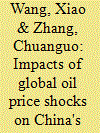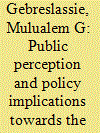|
|
|
Sort Order |
|
|
|
Items / Page
|
|
|
|
|
|
|
| Srl | Item |
| 1 |
ID:
167818


|
|
|
|
|
| Summary/Abstract |
China’s Belt and Road has been billed as the single most significant undertaking by the country on the international stage. In Africa, Kenya is a core part of both the Maritime Silk Road and the Belt. The authors have examined the flagship project of this initiative in Kenya, the Standard Gauge Railway (SGR) from the port of Mombasa to Nairobi, with a view to analyse the impact so far. Issues of employment, debt sustainability, neocolonialism and specific aspects of the project were looked at. Although our findings indicate that the SGR so far has both positive aspects as well as challenges, for the project to be successful both China and Kenya need to create a synergy towards solving concerns that have arisen from the completion of phase 1 of the project.
|
|
|
|
|
|
|
|
|
|
|
|
|
|
|
|
| 2 |
ID:
133210


|
|
|
|
|
| Publication |
2014.
|
| Summary/Abstract |
This paper investigated the impacts of oil price shocks on China×s fundamental industries. In order to analyze the reactions of different industries to oil price shocks, we focused on four fundamental industries: grains, metals, petrochemicals and oil fats. We separated the oil price shocks into two parts, positive and negative parts, to investigate how commodity markets react when oil prices go up and down. We further studied the extreme price movements, called jumps, existing in the oil markets and how jump behavior has affected China×s commodity markets. Our results suggest that asymmetric effects of oil price shocks did exist in the four markets and the negative oil price shocks had stronger influences on the four markets in China. The petrochemicals market suffered most from the oil price shocks, and the grains market was least sensitive to the shocks. When jumps occurred in the crude oil market, the four commodity markets would be affected differently. The oil fats market and petrochemicals market tended to "overreact" to jumps.
|
|
|
|
|
|
|
|
|
|
|
|
|
|
|
|
| 3 |
ID:
176672


|
|
|
|
|
| Summary/Abstract |
As part of the global effort in the development and deployment of renewable energy, Ethiopia is aggressively working to increase the share of those energy resources into the energy mix. Ethiopia is known for the use of hydropower generation systems but recently the country is introducing wind energy technologies and developed wind farms that started power generation in 2011. However, the public perception towards this new entrant of power generation system is not well understood. This paper therefore explores the perception of the public living within the wind farms. This is achieved through structured survey and conducting household level discussions with the community. The results showed that generally the public is supportive of such development but critical issues have been raised such as lack of prior consultation with the community by the developers, fairness of land compensation and generally lack of inclusive benefit packages from the wind farm development for the community. With the country planning for new wind farm development, it is crucial to devise comprehensive solutions and consider the recommended policy directions in this paper in order to develop public confidence and ownership for sustainability of the developed power generation systems.
|
|
|
|
|
|
|
|
|
|
|
|
|
|
|
|
| 4 |
ID:
156343


|
|
|
|
|
| Summary/Abstract |
AFTER the Sandinista National Liberation Front (FSLN) took power for a second time in 2007 and its leader, Daniel Ortega, again became president of Nicaragua, Russia's relations with that country have become closer and, moreover, acquired a new quality, developing into full-scale strategic partnership. Today, Nicaragua is Russia's main partner and ally in Central America. Russian presence in Nicaragua takes a diversity of forms - political contacts, economic relations, including trade and investment, cultural, scientific and technological cooperation. There are numerous reasons for this, primarily the two nations' desire to build equal, mutually respectful, and mutually beneficial cooperation in bilateral and multilateral formats, their deep involvement in regional political and economic processes, and their active roles in the world arena, where they hold identical or similar views on practically all key issues.
|
|
|
|
|
|
|
|
|
|
|
|
|
|
|
|
| 5 |
ID:
111419


|
|
|
|
|
| Publication |
2012.
|
| Summary/Abstract |
There is much current interest in the potential of community-based renewable energy projects to contribute to transition towards low carbon energy systems. As well as displacing fossil fuel consumption by increasing renewable energy generation, projects are expected to have a range of social impacts which may result in additional positive sustainability outcomes. These include potential to increase: acceptance of renewable energy developments; awareness of renewable and sustainable energy technologies and issues; uptake of low carbon technologies; and sustainable/pro-environmental behaviours. To date however, there has been little investigation of whether and how these impacts occur. This paper presents results from qualitative research investigating the social impacts of a community woodfuel project as experienced by project participants and other local stakeholders. Findings show projects can raise awareness of renewable energy technologies and increase uptake of renewables. Overall the case study project successfully changed the local social context for development of woodfuel heating, reducing risk for all involved in the future development of this sector, particularly in the immediate locality. There was some evidence of increased engagement with wider sustainability issues but this was limited to direct participants, suggesting local projects need to be supported by wider systemic change to maximise impacts.
|
|
|
|
|
|
|
|
|
|
|
|
|
|
|
|
|
|
|
|
|